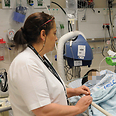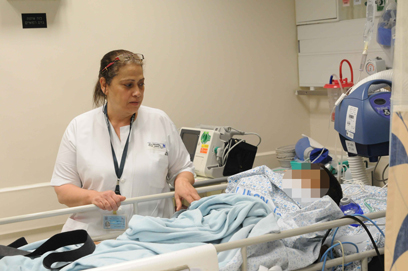
More than 100 wounded Syrians receive care in Israel
As conflict rages, Israel takes in influx of Syrian refugees in need of medical care; 'At first it was young men in their 20s, 30s; now they're younger, teenagers, sometimes even kids,' doctor at Safed hospital says
Their arrival in Israel came amid reports by international human rights organizations that the current death toll in the Syrian conflict has topped 100,000. The number of those injured has also seen a rise, and the two wounded boys join a long list of those hospitalized in Israel as a result of the conflict.
Related stories:
- NGO: More than 100,000 killed in Syria since uprising began
- Fragmentation grenade found on Syrian evacuated to Israel
- PM to soldiers in Golan: We'll win by instilling fear of death in enemy
The younger of the two was escorted by his father, who said that only two weeks ago his son had lost his eye as a result of a shell that exploded in their house. According to the father, Syrian doctors attempted to take care of him but to no avail. The boy is currently taking medication to prevent the damage from spreading to his second eye and to heal his leg which sustained shrapnel injuries.

Wounded Syrian boy receiving care (Photo: Avihu Shapira)
The condition of the second, older boy was more severe. He arrived in serious condition with shrapnel wounds across his entire body.
The boy recalled the incident that left him wounded – a rare feat according to doctors. The boy said he was riding on a tractor when suddenly he heard a blast. According to his doctors, the boy is suffering from a broken jaw, broken limbs and shrapnel in his back, in addition to the fact that some of his wounds have festered.
As mentioned, the two join a long list of Syrian's hospitalized in Israeli hospitals.
In Nahariya, a 12-year-old girl suffering from numerous broken bones all over her body has already undergone seven surgeries. Doctors have managed to stabilize her condition, which is currently considered moderate.
IDF representatives have instructed medical personnel to speak with the wounded Syrians only about their medical condition.
Every wounded Syrian is guarded by either an IDF soldier or by a civilian security guard in an attempt to isolate them from speaking with anyone unauthorized to do so who might photograph them or pass on their information to Syria, potentially harming them or their families upon their eventual return to Syria.
As stated, more than a 100 wounded Syrians have crossed the border in recent months. Some 70 of them have been taken to Israeli hospitals, and two have passed away as a result of their injuries.
Despite the publicity the care-giving could offer Israel and the IDF in terms of international opinion, the army rarely divulges neither the number of those taken in nor any details regarding their identities, fearing it would instigate a greater influx of wounded refugees coming into Israel – more than medical professionals could handle.
The IDF stressed that each case was treated individually and that some of the patients were sent back to Syria immediately after receiving treatment.
Younger and younger
Dr. Amram Hadari, head of the trauma unit at the Ziv Medical Center in Safed, which receives a major portion of the wounded, said that the Syrian patients are questioned only in regards to their medical condition.
"There are those that arrive in a relatively stable condition, and then between one 'ouch' to another we manage to squeeze in a question or two and get out a few answers, but only regarding their medical condition and the questioning process is undertaken solely for diagnostic purposes.
"We ask them where it hurts and we try to ascertain whether they were hurt by gunfire or by an explosion, but most times they don't know the exact circumstances," he said.
According to Dr. Hadari, the injured arrive from a number of different places in Syria, sometimes even after receiving medical treatment.
"Two weeks ago somebody arrived with an official letter from a doctor; another time someone showed up with an undecipherable letter which did little to help us. Usually," he revealed, "the care they receive in Syria is makeshift; in any case they also receive first aid on both sides of the border."
According to the hospital, as time passes, the age of the wounded seems to decrease.
"At first it was young men in their 20s and 30s, now they're younger, teenagers and sometimes even kids," Hadari said, adding that "usually, we know what their background is, except in extreme situations like the person who arrived in uniform and had a grenade in his pocket. Sometimes they arrive in uniform, other times in jeans. Either one doesn't necessarily point to them being either a civilian or soldier.
Maor Buchnik contributed to this report
- Receive Ynetnews updates directly to your desktop










